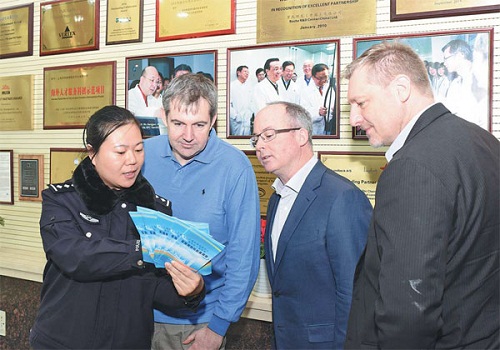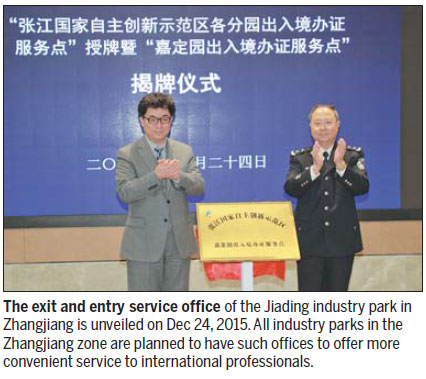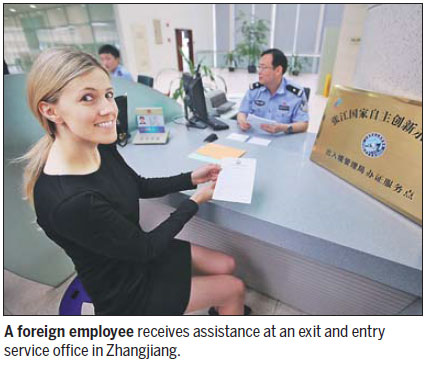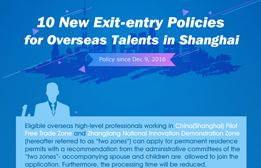Zone focuses on human resources
Recruitment services and policies attract talented professionals worldwide to contribute to local businesses
The Zhangjiang National Innovation Demonstration Zone is carrying out an internationalized talent introduction strategy, building an innovation and entrepreneurship base for global top professionals and an industry park for overseas graduates.
The Zhangjiang administration has established overseas talent developing bases in 34 countries and regions around the world, through which it selects high-end personnel in its most crucial sectors for integration into the area's technological resources, projects and capital.
More than 100 projects have been introduced to Zhangjiang. One of them, focusing on a method for cutting semiconductor wafers, led by Wang Zhongke, was a candidate for the R&D 100 Awards in the United States. The team has finished prototypes in Singapore, and registered a company in Zhangjiang's Songjiang industry park.

A police officer introduces the exit and entry policies in Shanghai to overseas professionals. Photos provided to China Daily
The local administration uses international standards to manage contracts and offer payments in a number of major projects, including those focusing on stem cells, quantum communication, medical big data and advanced sensors. More than 470 experts from both China and overseas have participated in the projects.
The administration encourages companies to hire part-time researchers from universities and research institutes. There were more than 700 such part-time researchers by 2016.
Twelve personnel training and practice bases have been established in the industry-leading companies. More than 3,000 people have taken part in the training programs since the beginning of this year.
The administration encourages universities and companies to establish cooperation, set up labs to develop professionals and integrate studying, research and production.
Through this mechanism, university professors become research team leaders, and students working in the labs earn extra academic credits. Universities and companies cooperate to commercialize their research achievements.
There are currently 18 such labs with 6,400 postgraduate students.
There are also many non-governmental human resource service platforms in all the industry parks of the Zhangjiang zone, funded by privately owned professional companies and social organizations. The local government also uses them to optimize services.
They offer regular follow-up services and management to overseas personnel, asking what they need.
They provide one-stop services, combining online consultation and offline services, which include release of recuitment lists, human resource policy consultation, training, guidance and company registration.
They have developed public service products on mobile terminals targeting foreigners and expanded their service range thanks to the convenient exit and entry services in all the industry parks in Zhangjiang.
The administration has been promoting an innovation and entrepreneurship pilot project by offering preferential policies and financial support to 118 business incubators and more than 220 makerspaces, allowing startup teams to cooperate with leading universities, research institutions, large companies' headquarters, science parks and investment institutions.
About one-third of the makerspaces in Zhangjianghave have involved overseas investment or are targeting mainly international projects development.
To optimize the local environment of innovation and entrepreneurship, introduce and nurture talented personnel, industrialize scientific achievements and promote emerging industries, the Zhangjiang administration has launched a special fund.
The fund includes 120 specific financial aid measures, covering all aspects concerning talent development, including subsidiaries for occupational training, continuing education and professional labs by introducing high-level experts.
Some service projects, such as the online human resources information platform, apartments, medical insurance and international schools, also have won subsidiaries, awards and discount loans.
Projects conducted by companies in the zone with universities or research institutions can apply for financial support of up to 110 million yuan ($15.9 million) for tests, trial operations and applications.
In addition to governmental subsidies and awards, the administration has also used social capital to support innovation and entrepreneurship. Since 2015, the Zhangjiang zone has invested more than 300 million yuan in the technical financing platform, attracting nearly 40 billion yuan in social capital for its projects.



 Print
Print Mail
Mail




